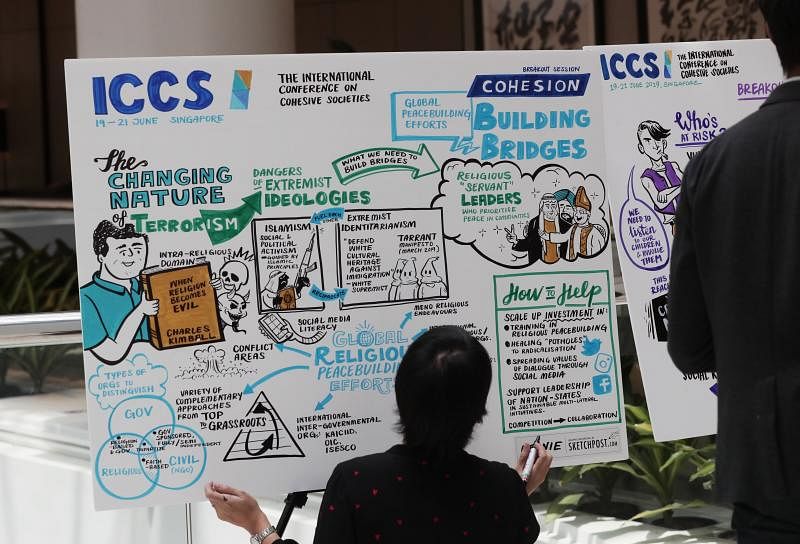Religious and worldview studies in schools can help strengthen social cohesion, say experts
Sign up now: Get ST's newsletters delivered to your inbox

The three-day International Conference on Cohesive Societies brought together around 1,000 academics, officials and members of religious and civil society groups from close to 40 countries, to discuss issues surrounding faith, identity and cohesion.
ST PHOTO: KELVIN CHNG
SINGAPORE - Having a religious studies curriculum in schools can bolster social cohesion, by helping young people develop a positive outlook of those from other faiths, experts said at an interfaith conference in Singapore on Friday (June 21).
Such programmes - which teach students about the major world religions and their worldviews - can also cultivate the ability to have meaningful conversations and relationships with those from other faiths, they add.
Education was a central theme at the third and final plenary session - called "How We Come Together (Cohesion)" - of the International Conference on Cohesive Societies (ICCS) which wrapped up on Friday.
The three-day inaugural event brought together around 1,000 academics, officials and members of religious and civil society groups from close to 40 countries, to discuss issues surrounding faith, identity and cohesion.
While the experts at Friday's plenary agreed on the importance of education in strengthening social cohesion, they were mindful of the views national or state governments may have towards implementing a religious study curriculum into the secular school system.
Dr Anna Halafoff, a United Nations Alliance of Civilisations' Global Expert in Religion and Peacebuilding, citing the Australian state of Victoria as an example, said that it was only in 2015 that learning about religions and worldviews were included in the state curriculum.
"So I think many secular states are coming to terms with the fact that you can have unbiased and critical social-scientific education about diverse worldviews within secular education systems, in order to increase religious literacy," said Dr Halafoff, who is from Deakin University in Victoria.
Dr Halafoff said that a recent national study in Australia of young people and their attitudes towards religion found that those who underwent programmes about religions and worldviews had more positive attitudes towards religious minorities.
Professor Lai Pan Chiu from the Chinese University of Hong Kong's Faculty of Arts said that governments need to be convinced that interfaith education is good for the students' moral and spiritual development, and ultimately for society.
"Ignorance is the hotbed for hostility (and) distrust... and it's not good for the cultivation of racial and inter-religious harmony," Prof Lai said.
Prof Lai said that in Hong Kong, students in religious schools focus on studying their own faiths from Form 1 to 3 (12 to 15 years old), but can take on an inter-religious course called Ethics and Religion Studies from From 4 to 6 (16 to 18 years old).
Among various aims, the course helps them acquire knowledge of the religion they study and other major faiths, and also on how to make rational and informed judgment about religious and moral issues, said Prof Lai.
Inter-religious studies help raise students' cultural awareness, making them realise that they always see things from a particular tradition or position. This contributes towards the formation of a humble and open-minded attitude towards others, Prof Lai added.
Bishop Emeritus Dr Wee Boon Hup, a member of Singapore's Presidential Council for Religious Harmony, said education goes beyond the information which is communicated in the classroom.
"Eventually in the long run, you need to have that face-to-face encounter, develop that relationship with someone from the other religion, or other faith, or other race," said Dr Wee.
Dr Ali Al Nuaimi, chairman of the World Council of Muslim Communities, said: "We need to invest in education, where we will show the common values that bring us together, that we share as humanity, to our kids."
The ICCS, organised by Nanyang Technological University's S. Rajaratnam School of International Studies with the support of the Ministry of Culture, Community and Youth, concluded with closing remarks and a dialogue with Deputy Prime Minister Heng Swee Keat.


